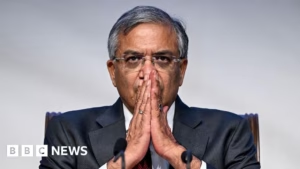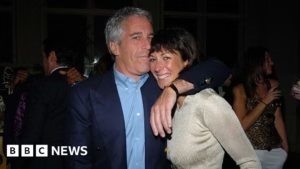In July, Godswill Akpabio, the head of Nigeria’s senate, issued a rare apology to Natasha Akpoti-Uduaghan after criticizing her for speaking out of turn. The apology came after a barrage of insults sent via text messages from Nigerians. This incident has set off a political dispute in the nation after Akpoti-Uduaghan accused Akpabio of sexual harassment in an interview with Arise TV in late February.
The accusations she made included an incident where Akpabio suggested that a motion she proposed could be considered by the senate if she “took care of him,” and another involving an invitation to his house, where he allegedly expressed a desire to spend quality time with her.
Despite her allegations, Akpabio has vehemently denied any wrongdoing. Akpoti-Uduaghan’s petition to the senate regarding the alleged harassment was dismissed on procedural grounds and she was handed a six-month suspension for her “unruly and disruptive” behavior in a separate incident.
The situation has highlighted Nigerian women’s ongoing struggle for representation and protection against sexual harassment in a predominantly conservative society. Women make up a small fraction of the legislature in Nigeria; currently, only four out of 109 senators are women, down from seven in 2015. Similarly, there are now 17 women in the 360-member House of Representatives, down from 22 in 2015.
Akpoti-Uduaghan, a senator from the central state of Kogi, has criticized her suspension as a means to silence her. She spoke out against the decision during a meeting of the Inter-Parliamentary Union and UN Women. Her suspension has been met with significant backlash from women’s rights groups and activists, with protests held in multiple states under the banner “We are all Natasha”.
The controversy surrounding Akpoti-Uduaghan’s allegations shows the deep-rooted problems facing women in Nigerian politics. Even after a tribunal overturned the results of her gubernatorial campaign in 2023, paving the way for her to become a senator, it appears she still faces significant challenges and derision. Despite her standing as a prominent political figure, some male senators and even fellow female senators have repudiated her claims.
This episode has sparked discussions about the treatment of women in power in Nigeria. Ireti Bakare-Yusuf, a radio broadcaster and the founder of the Purple Women Foundation, condemned the senate’s handling of the situation as “a shambolic show of shame”. Meanwhile, Glory Ehiremen, a senior analyst at SBM Intelligence, points to a culture of impunity and political alliances as roadblocks to effectively addressing and punishing workplace sexual harassment.
The fallout from Akpoti-Uduaghan’s suspension has been intense, with pro-Akpabio protests and accusations of “content creation” for a kiss shared with her husband prior to submitting her petition. Nonetheless, it seems that while more women are rallying behind Akpoti-Udughan, expressing solidarity and bravery, not everyone thinks Nigeria is on the brink of a #MeToo movement.
For now, the situation continues to highlight the lack of safety and equity for women in Nigerian politics. As Ehiremen underscores, without meaningful change in addressing these issues, the powerful in Nigeria will remain largely untouchable and protected from accountability.
Source: https://www.theguardian.com/world/2025/mar/16/senator-sexual-harassment-claims-nigeria-natasha-akpoti-uduaghan









